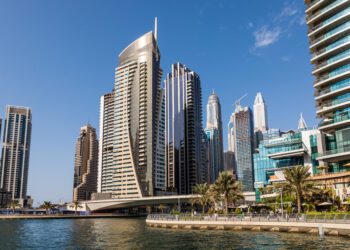Dubai, known for its opulent real estate offerings, has witnessed a remarkable surge in luxury home prices, climbing nearly 50% over the past year, and retaining its top position for the eighth consecutive quarter. This data comes from a recent report by Knight Frank, a leading property consultancy firm.
Data released by Knight Frank reveals that Dubai’s luxury property market has experienced an astounding 225% increase in prices since reaching its lowest point during the third quarter of 2020, showcasing the Emirate’s resilience in the face of global challenges.
Not far behind, Tokyo secured second place with a substantial annual increase of 26.2%, while Manila claimed the third spot with a notable 19.9% rise in luxury property prices.
Additionally, other cities exhibited noteworthy growth. Shanghai in China recorded a solid 6.7% increase, and Singapore saw a respectable 4.2% rise in luxury home prices.
Singapore’s property market, in particular, has been influenced by an influx of expatriates, driven by a thriving financial and professional services sector.
This growth, however, has had a more significant impact on the rental market compared to the sales market. The report attributes this disparity in part to taxation policies affecting foreign buyers.
In recent months, Singapore has doubled the buyer’s stamp duty for foreign investors, now requiring them to pay 60% of the property’s value, up from the previous 30%.
Hong Kong, on the other hand, experienced a 1.5% decline in luxury property prices over the past year, primarily due to an oversupply of unsold units from newly developed projects.
To stimulate demand, the Hong Kong government has raised the mortgage loan-to-value ratio to 70% for residential properties valued at 15 million Hong Kong dollars ($1.9 million) or less.
While this move is expected to appeal to buyers, its potential to significantly boost market growth remains uncertain, according to Knight Frank’s analysts.
In contrast, some cities witnessed declines in luxury property prices. New York saw a 3.9% drop, and San Francisco experienced an 11.1% plunge, while Frankfurt, Germany, ranked at the bottom of the list with a 15.1% decrease.
Despite variations in performance across different markets, the overall trend reveals an average annual price increase of 1.5% across the 46 markets covered by the Knight Frank Prime Global Cities Index.
Liam Bailey, Global Head of Research at Knight Frank, acknowledged the pressure faced by global housing markets due to rising interest rates.
However, he emphasized that the results from the index confirm that prices are supported by robust demand, a shortage of supply stemming from disruptions in new construction projects during the pandemic, and the return of workers to urban centers.
Bailey further noted that as uncertainty regarding inflation’s direction has diminished in recent months, price adjustments in many markets are likely to be less dramatic than initially expected.
Stay tuned with us for more updates on the ever-evolving landscape of wealth and luxury real estate. Your prosperity is our priority, and we are here to empower you on your path to financial success.
Read more stories here:
Dubai Billionaire Finds the Secret to Health, Youth, and Age Reversal

















